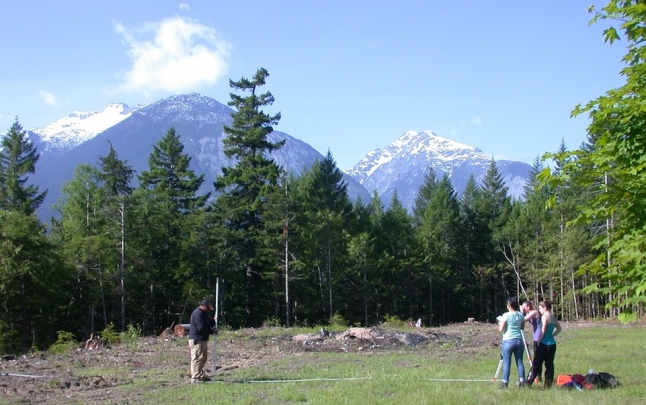Archaeology Field School
Archaeology Field School 2024
Charlie Lake (Ft. St. John), British Columbia
May 13 - June 22, 2024
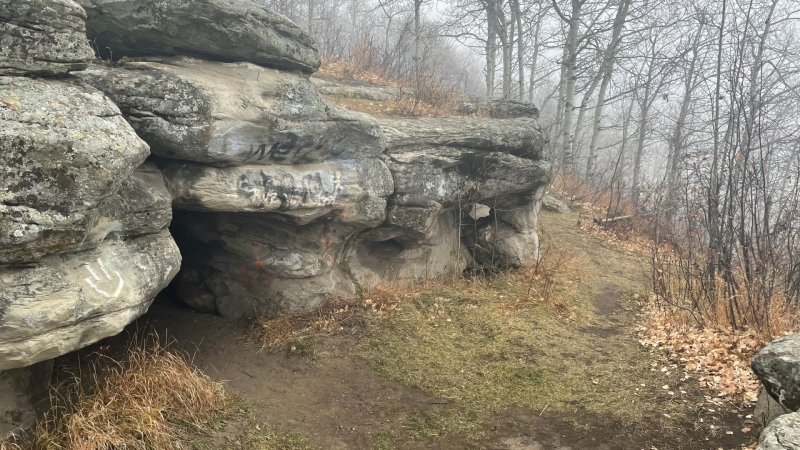
The UNBC Department of Anthropology and the Tse’K’wa Heritage Society are pleased to offer an archaeology field school during the summer of 2024, subject to sufficient enrollment.
This 9-credit field school takes place at Tse’K’wa (“Stone House”), also known as Charlie Lake Cave, located in Treaty 8, Traditional Territory of the Dane-zaa First Nations Peoples. This community engaged project is conducted in partnership with the Tse’K’wa Heritage Society (Doig River First Nation, Prophet River First Nation, and West Moberly First Nations). This is the second field school that is part of a research project, which is co-directed by Dr. Farid Rahemtulla (UNBC) and by Dr. Mike Richards from Simon Fraser University (SFU).
Tse’K’wa (Rock House in Dane-zaa) was previously excavated by archaeologists from SFU, which revealed a very long history of use by Indigenous peoples. These research excavations show that the site dates back to at least 12,500 years, making it one of the oldest known archaeological sites in British Columbia. The site has also revealed evidence for changes in local environment (including plants and animals) over several millennia. In addition to the remarkable archaeological history, the site holds a deep cultural and spiritual significance to the Dane-zaa People.
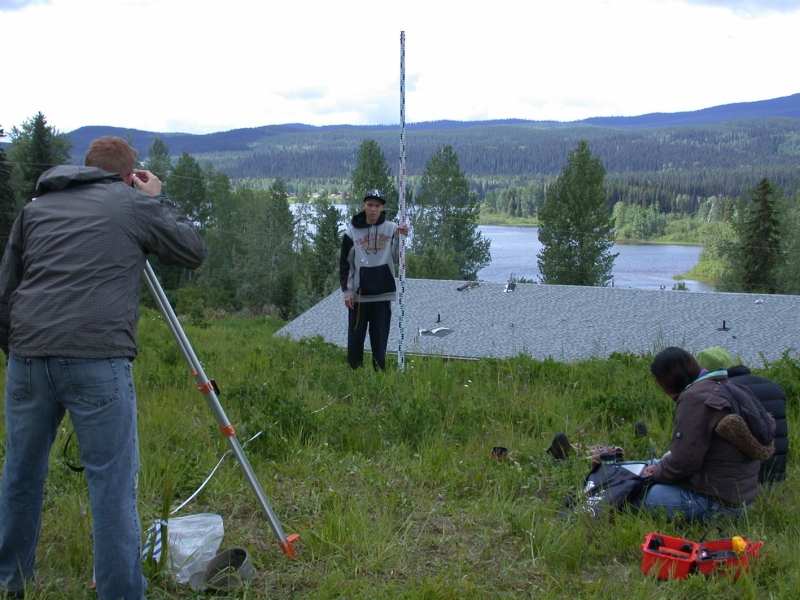
Tuition and Fees
The cost of the field school is tuition for 9 credits (approximately $1,800 for Canadian residents) plus a $1,850 fee to cover the cost of logistics and project supplies. The extra fee also covers transportation to the project area from Prince George and back, as well as food in the field.
Non-Canadian residents:
Please refer to the UNBC Academic Calendar for International Students' fees.
Check out this short video by Kirk Walker on our 2010 field school with the Lake Babine Nation.
https://www.youtube.com/watch?v=oS99uV3PBxU
Other Costs
Each student is responsible for providing their own required readings, tents, sleeping bags, and other personal equipment and supplies (list will be provided).
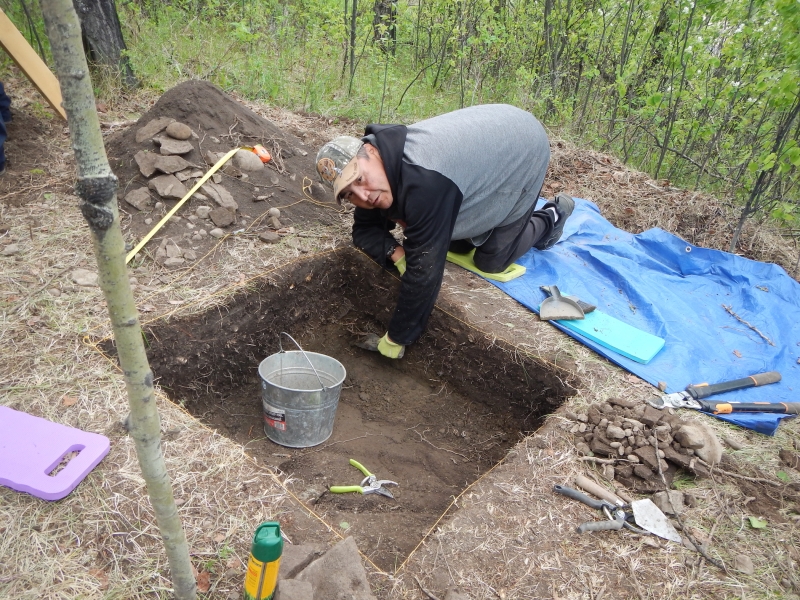
Schedule
The entire program will be delivered in the field; there will be no classes on the Prince George campus. The field school crew will travel from Prince George to Fort St. John, BC, on May 13, with transportation of people and gear provided by the project. The first phase features gatherings and discussions, lectures, experimental archaeology, and practical exercises on survey and mapping. The field school will participate in Doig Day, to be held in May or June. During the second phase the group will engage in testing, excavations and lab analyses at Tse’K’wa. At the end of phase two the field camp will be struck down and students will be transported back to Prince George by June 22. The field school will participate in National Indigenous Peoples Day on June 21.
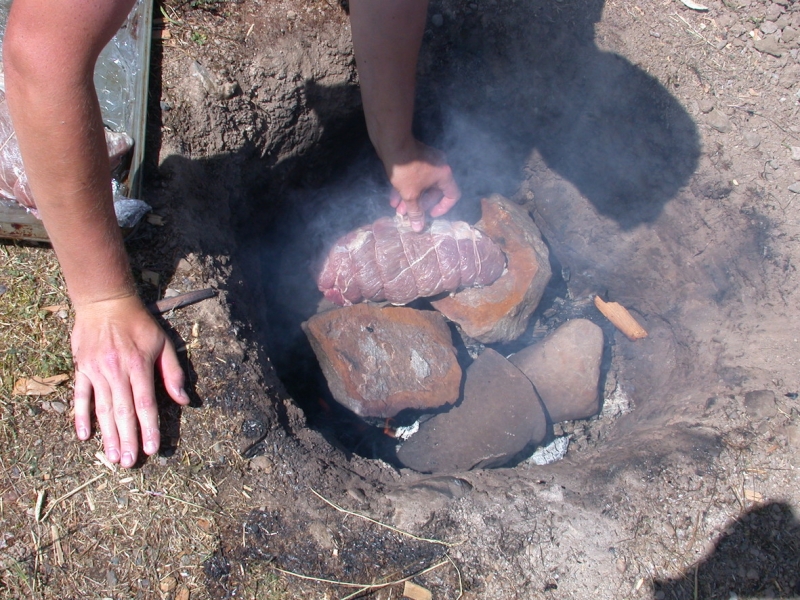
Accommodation and Camp Life
The field school will be based at a camp on private property that also includes Tse’K’wa. Students have to bring their own tents and sleeping bags for the camp, and for any field trips. Everyone will be a full participant in camp life, including helping with the camp set up and take down, preparing meals and equipment maintenance. Camp life is rustic but comfortable. This area has plenty of wildlife, and so all students must adhere to basic camp safety rules. Electrical power is available at select points on the property, and wifi internet access is available near the house.
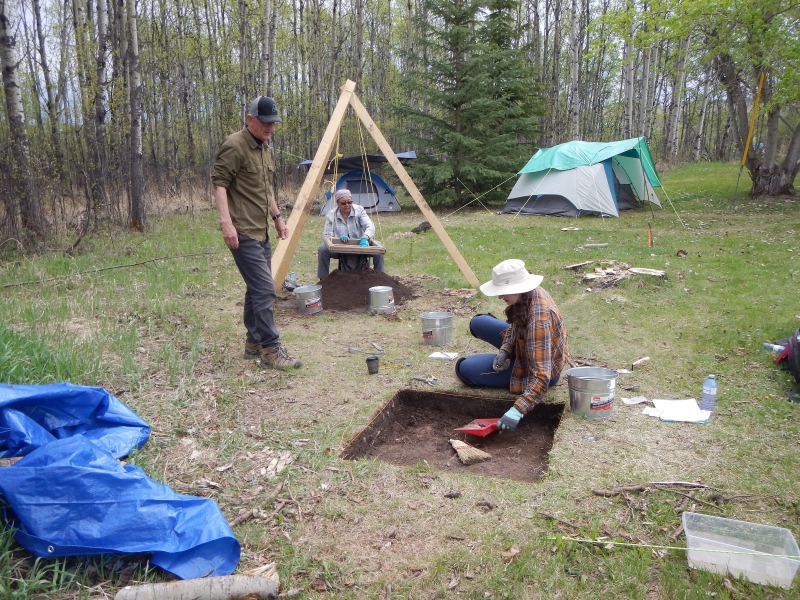
Field Research
The second phase consists of several weeks of field survey, testing and excavation. The group will conduct research testing and excavations throughout the property. In 2024 we will expand our experimental archaeology program to potentially include construction and use of a traditional earth oven, and making and using stone tools to recreate some of the plant based material culture such as spears, digging sticks, and cordage. Overall, students will receive comprehensive training in archaeological field research and they may be exposed to various types of: landforms, sites, data collection and analysis techniques, and material culture. Indigenous community members will share knowledge, so students will also learn about Dane-zaa culture history and traditions.
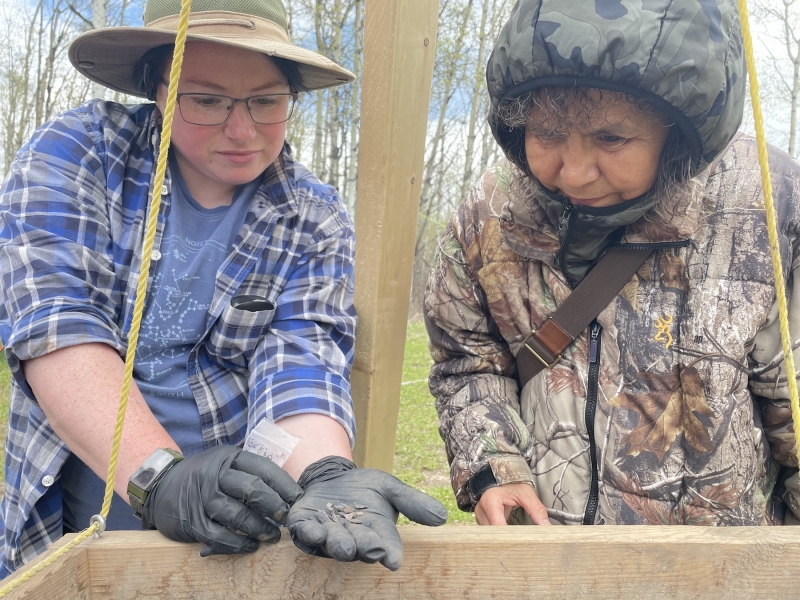
Overall
Throughout the project participants will become familiar with basic concepts in archaeological survey and mapping, lithic and organic technology, traditional subsistence, and they will receive training in the use of appropriate equipment. Students will learn to operate and analyze data and create maps via a variety of equipment including compass and GPS, total station, and UAV. In 2024 students will also learn about the latest archaeological science techniques that will be used to shed light on the deep history of the site. Local and long distance field trips may be undertaken to enhance learning. Students will also be introduced to issues on conducting archaeology with Indigenous peoples, particularly on the importance of integrating Traditional Knowledge and oral histories. If available, Elders and other community members may share their knowledge on culture and history. In past field schools such knowledge has been in the form of story telling and song, collecting plant foods and medicinal plants, constructing summer dwellings, creating roasting pits, learning fishing and processing techniques, working with traditional technologies and more. An important goal of the field school is to encourage participants to bridge the gap between Traditional Knowledge and Western Knowledge. To foster this, university students will take field school courses side by side with Dane-zaa and other community members.
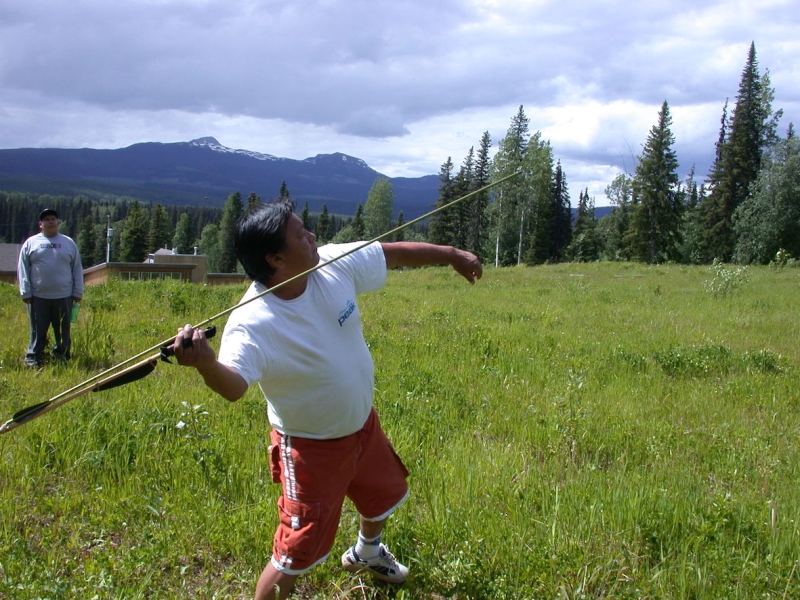
Completion
Upon completion of the field school students will have: a good grounding in the techniques and methods of archaeological survey and excavation; an understanding of Interior British Columbia archaeology; and legislation pertaining to heritage management in British Columbia. Participants will also have an awareness of the social context of conducting archaeology on Indigenous history, and the importance of Indigenous perspectives and community-engaged approaches. With this training and upon graduation, students are eligible for employment in the Cultural Resource Management (CRM) sector in British Columbia. Successful completion of an archaeology field school is a necessity for employment in archaeological consulting. Several participants of our previous field schools are now employed in CRM. In the last fifteen years more than fifty of our field school graduates have found employment in CRM, a very high success rate. This training will also greatly benefit students that intend to continue their studies in graduate work, or those with an interest in archaeology and/or Indigenous history.
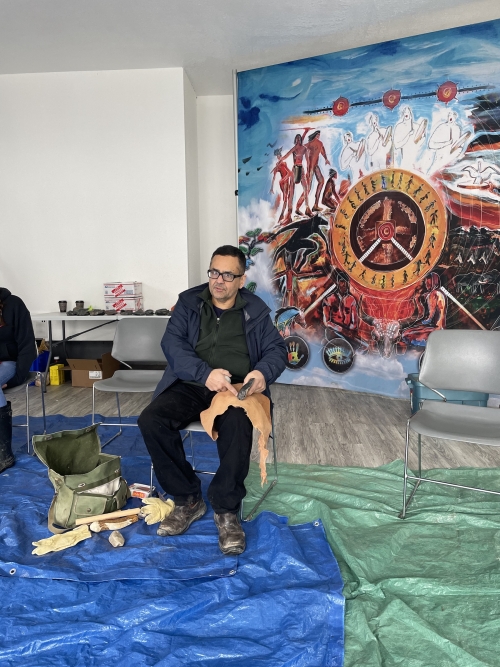
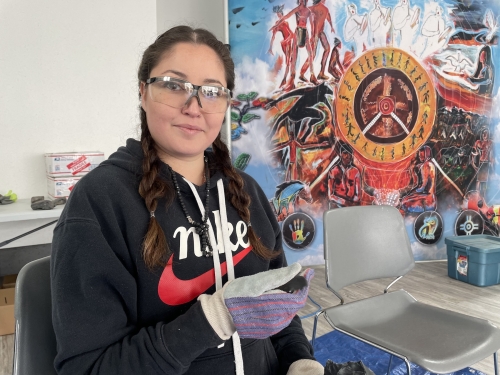
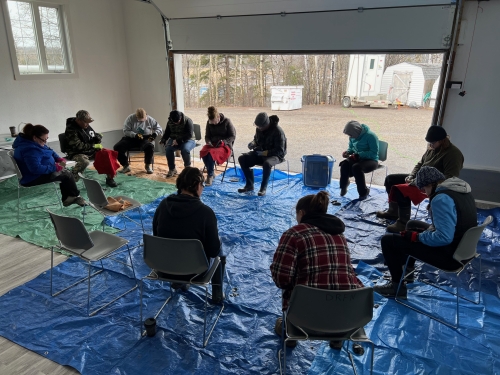
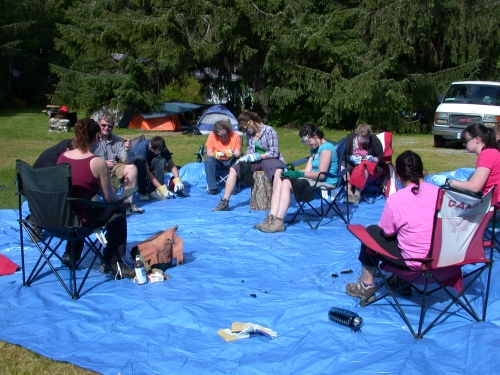
Flintknapping – learning to make stone tools
Course Description
The field school consists of two courses worth a total of 9 credits. Students accepted into the field school MUST register for both courses.
ANTH 417-6 Excavation and Field Interpretation in Archaeology
ANTH 418-3 Archaeology and First Nations
Students that have completed the greatest number of archaeology courses will be given priority, followed by those that have taken ANTH 205 (Introduction to Archaeology). All students that have successfully completed any other archaeology courses (ANTH 203, ANTH 212), however, are eligible to apply. Previous course grades will be factored into the ranking system for accepting applicants.
Application Process
Application Deadline: March 25, 2024
1. All potential participants must submit an application form (see below).
2. Upon admission to the field school, official Instructor Approval for registration in ANTH 417-6 and ANTH 418-3 will be granted.
3. Non-UNBC Students will have to apply for general admission prior to registration.
You must be accepted into the field school prior to registering in ANTH 417-6 and ANTH 418-3.
Please complete the application form and forward to Dr. Farid Rahemtulla (address at the bottom of the application form).
Click here to download a printable version of the 2024 Application Form
Please note that a non-refundable deposit of $300 is payable upon acceptance and registration.
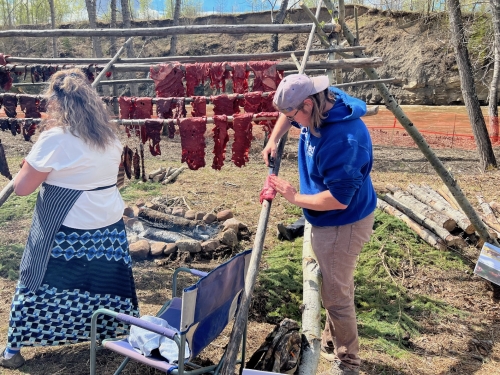
Contact Information
For further information please contact Dr. Farid Rahemtulla
farid.rahemtulla@unbc.ca
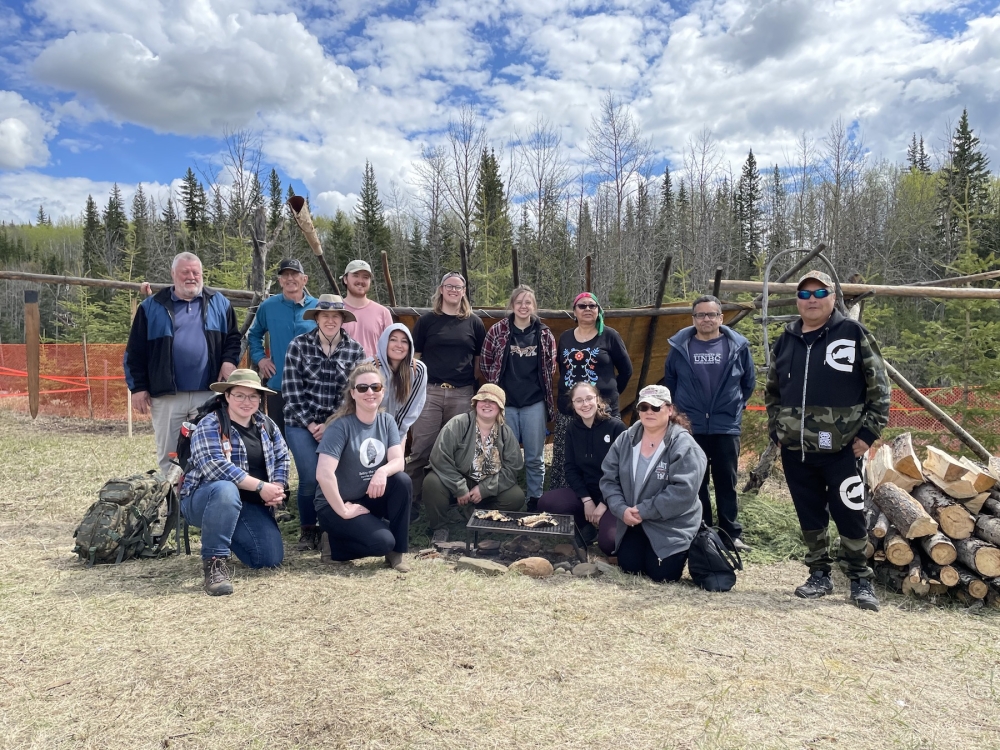
Archaeology Field School 2022
Charlie Lake (Ft. St. John), British Columbia
May 2 – June 10
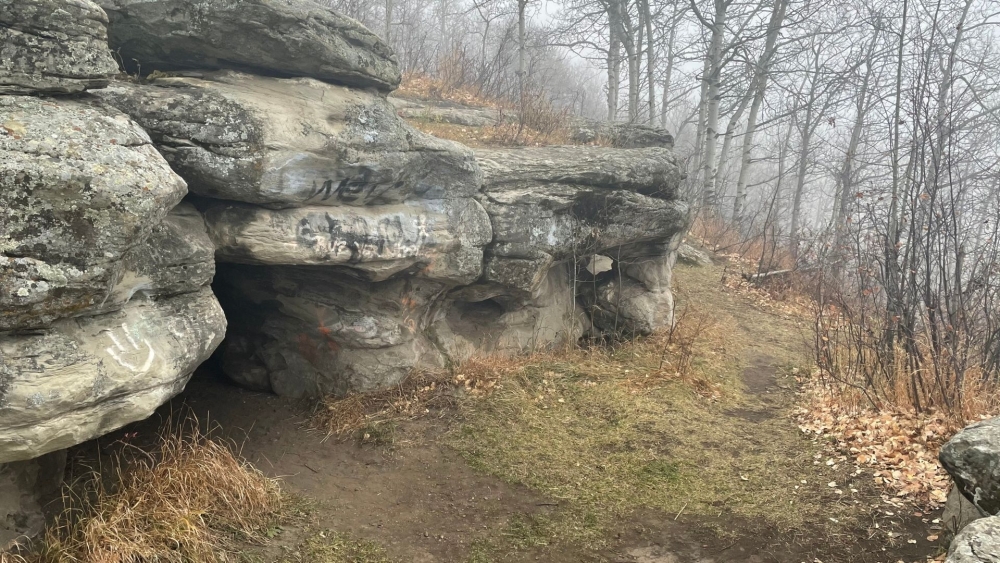
The UNBC Department of Anthropology and the Tse’K’wa Heritage Society ((http://treaty8.bc.ca/tsekwa/)) are pleased to offer an archaeology field school during the summer of 2022, subject to sufficient enrolment.
This 6-credit field school takes place at Tse’K’wa, also known as Charlie Lake Cave, located in Treaty 8, Traditional Territory of the Dane-zaa First Nations Peoples. For this project we are partnered with the Tse’K’wa Heritage Society (Doig River First Nation, Prophet River First Nation, and West Moberly First Nations). The field school is part of a research project that is co-directed by Dr. Farid Rahemtulla (UNBC) and by Dr. Mike Richards from Simon Fraser University (SFU).
Tse’K’wa (Rock House in Dane-zaa) was previously excavated by archaeologists from SFU, which revealed a very long history of use by Indigenous peoples. These research excavations show that the site dates back to at least 11,000 years, making it one of the oldest known archaeological sites in British Columbia. The site has also revealed evidence for changes in local environment (including plants and animals) over several millennia. In addition to the remarkable archaeological history, the site holds a deep cultural and spiritual significance to the Dane-zaa People.
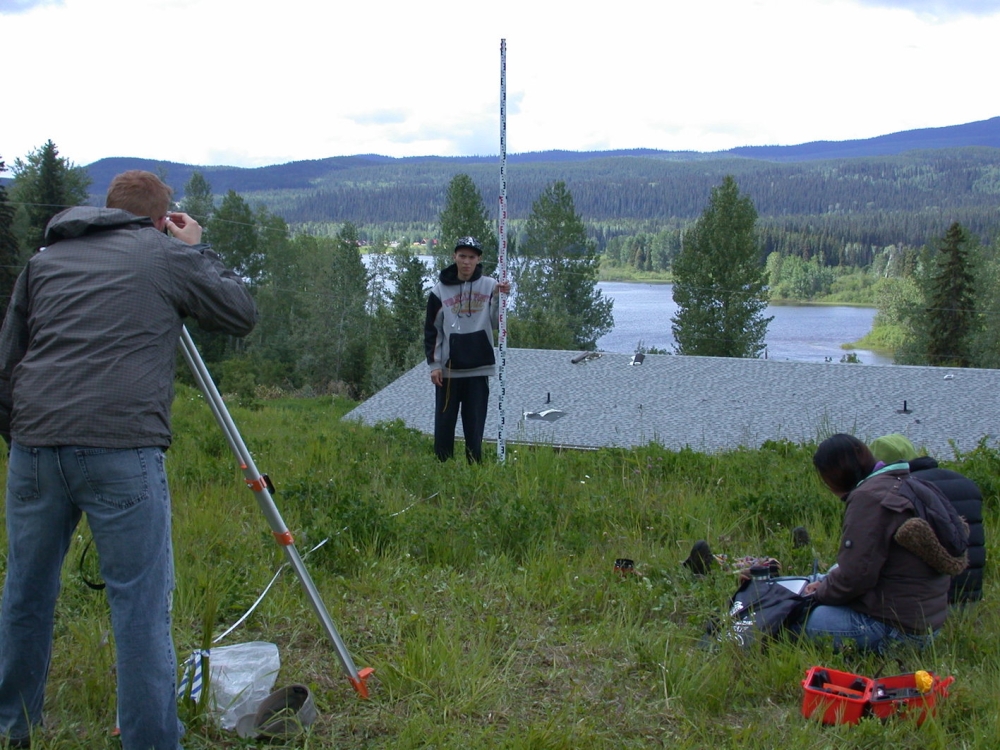
Tuition and Fees
The cost of the field school is tuition for 6 credits (approximately $1,130 for Canadian residents) plus a $2,100 fee to cover the cost of logistics and project supplies. The extra fee also covers transportation to the project area from Prince George and back, as well as food in the field.
Non-Canadian residents:
Please refer to the UNBC Academic Calendar for International Students' fees.
Check out this short video by Kirk Walker on our 2010 field school at Babine. https://www.youtube.com/watch?v=oS99uV3PBxU
Other Costs
Each student is responsible for providing their own textbooks, tents, sleeping bags and other personal equipment and supplies (list will be provided).
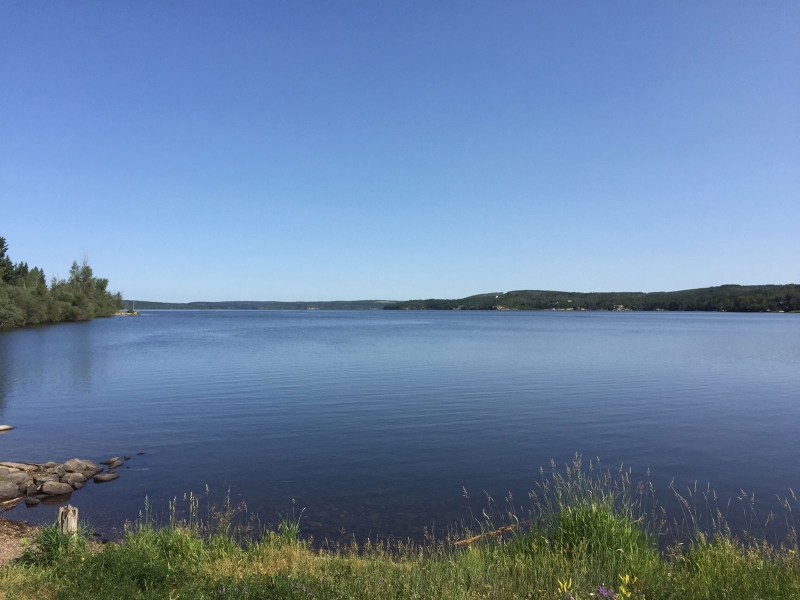
Schedule
The entire program will be delivered in the field; there will be no classes on the Prince George campus. The field school crew will travel from Prince George to Fort St. John, BC, with transportation of people and gear provided by the project. The first phase features gatherings and discussions, lectures, experimental archaeology, and practical exercises on survey and mapping. During the second phase the group will engage in testing, excavations and lab analyses at Tse’K’wa. At the end of phase two the field camp will be struck down and students will be transported back to Prince George by June 10.

Accommodation and Camp Life
The field school will be based at a camp on private property that also includes Tse’Kwa. Students have to bring their own tents and sleeping bags for the camp, and for any field trips. Everyone will be a full participant in camp life, including helping with the camp set up and take down, preparing meals and equipment maintenance. Camp life is rustic but comfortable. This area has plenty of wildlife, and so all students must adhere to basic camp safety rules. Electrical power is available at the house; however, priority of use will be given to teaching and research equipment.

Field Research
The second phase consists of several weeks of field survey, testing and excavation. The group will conduct research testing and excavations throughout the property. In 2022 we will expand our experimental archaeology program to potentially include construction and use of a traditional earth oven, and using stone tools to recreate some of the plant based material culture such as spears, digging sticks, and cordage. Overall, students will receive comprehensive training in archaeological field research and they may be exposed to various types of: landforms, sites, data collection and analysis techniques, and material culture. Indigenous community members will share knowledge, so students will also learn about Dane-zaa culture history and traditions.
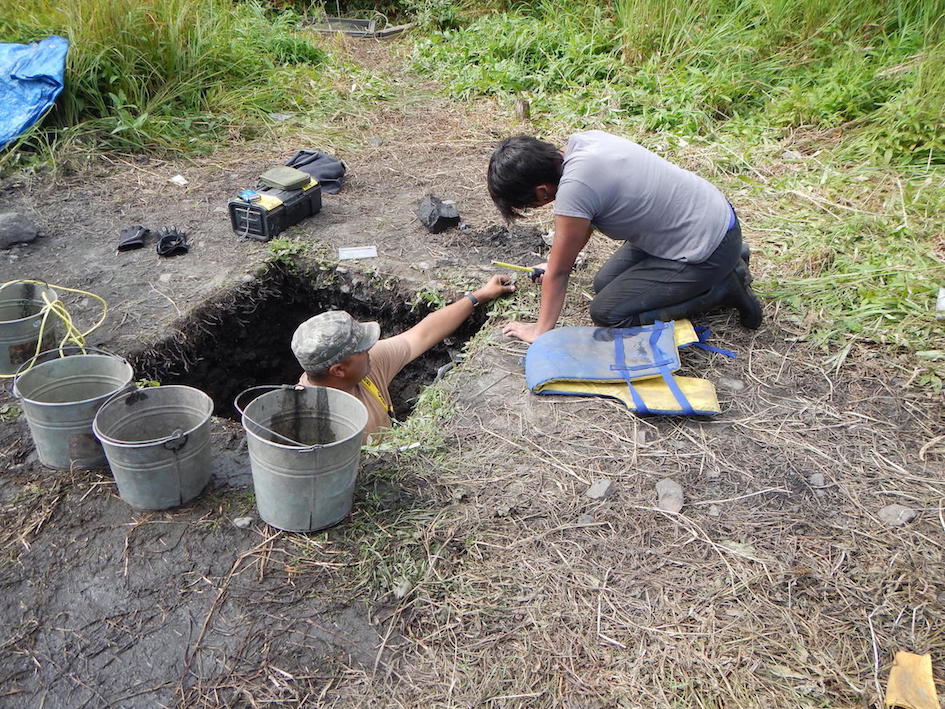
Overall
Throughout the project participants will become familiar with basic concepts in archaeological survey and mapping, lithic and organic technology, traditional subsistence, and they will receive training in the use of appropriate equipment. Students will learn to operate and analyze data and create maps via a variety of equipment including compass and GPS, total station, and UAV. In 2022 students will also learn about the latest archaeological science techniques that will be used to shed light on the deep history of the site. Local and long distance field trips may be undertaken to enhance learning. Students will also be introduced to issues on conducting archaeology with Indigenous peoples, particularly on the importance of integrating Traditional Knowledge and oral histories. If available, Elders and other community members may share their knowledge on culture and history. In past field schools such knowledge has been in the form of story telling and song, collecting plant foods and medicinal plants, constructing summer dwellings, creating roasting pits, learning fishing and processing techniques, working with traditional technologies and more. An important goal of the field school is to encourage participants to bridge the gap between Traditional Knowledge and Western Knowledge. To foster this, university students will take field school courses side by side with Dane-zaa and other community members.
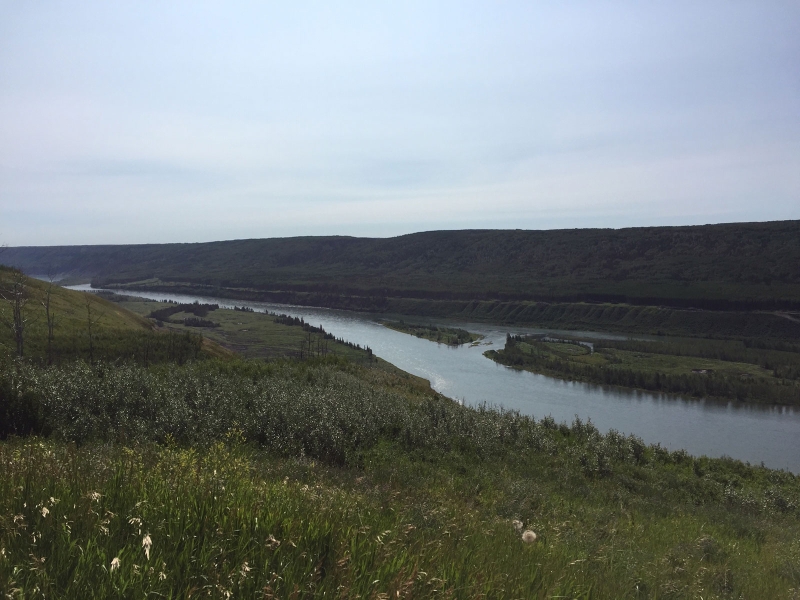
Completion
Upon completion of the field school students will have: a good grounding in the techniques and methods of archaeological survey and excavation; an understanding of Interior British Columbia archaeology; and legislation pertaining to heritage management in British Columbia. Participants will also have an awareness of the social context of conducting archaeology on Indigenous history, and the importance of Indigenous perspectives and community-engaged approaches. With this training and upon graduation, students are eligible for employment in the Cultural Resource Management (CRM) sector in British Columbia. Successful completion of an archaeology field school is a necessity for employment in archaeological consulting. Several participants of our previous field schools are now employed in CRM. In the last ten years more than fifty of our field school graduates have found employment in CRM, a very high success rate. This training will also greatly benefit students that intend to continue their studies in graduate work, or those with an interest in archaeology and/or Indigenous History.
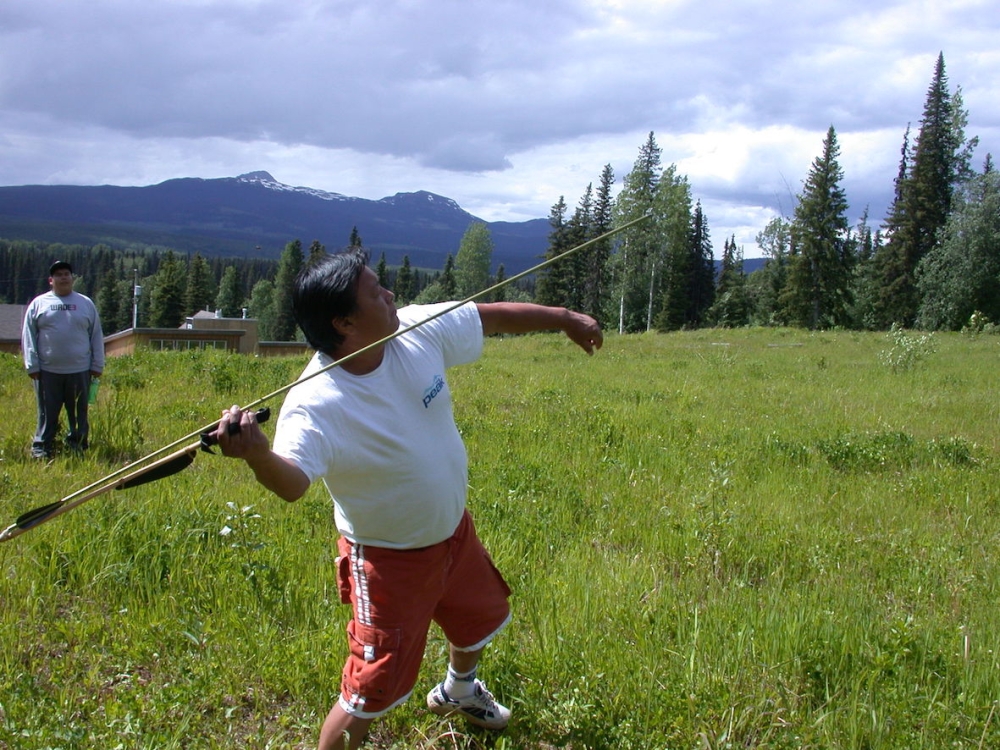
Course Description
The field school consists of one course worth a total of 6 credits.
ANTH 417-6 Excavation and Field Interpretation in Archaeology
click here for printable copy of calendar course descriptions
Students that have completed the greatest number of archaeology courses will be given priority, followed by those that have taken ANTH 205 (Introduction to Archaeology). All students that have successfully completed any other archaeology courses (ANTH 203, ANTH 212), however, are eligible to apply. Previous course grades will be factored into the ranking system for accepting applicants.
Application Process
Application Deadline: March 15, 2022
1. All potential participants must submit an application form (see below).
2. Once admission to the field school is granted, Instructor Approval for registration in ANTH 417-6 will be granted.
3. Non-UNBC Students will have to apply for general admission prior to registration.
You must be accepted into the field school prior to registering in ANTH 417-6.
Please complete the application form and forward to Dr. Farid Rahemtulla (address at the bottom of the application form).
Click here to download a printable version of the Application Form
Please note that a non-refundable deposit of $300 is payable upon acceptance and registration.
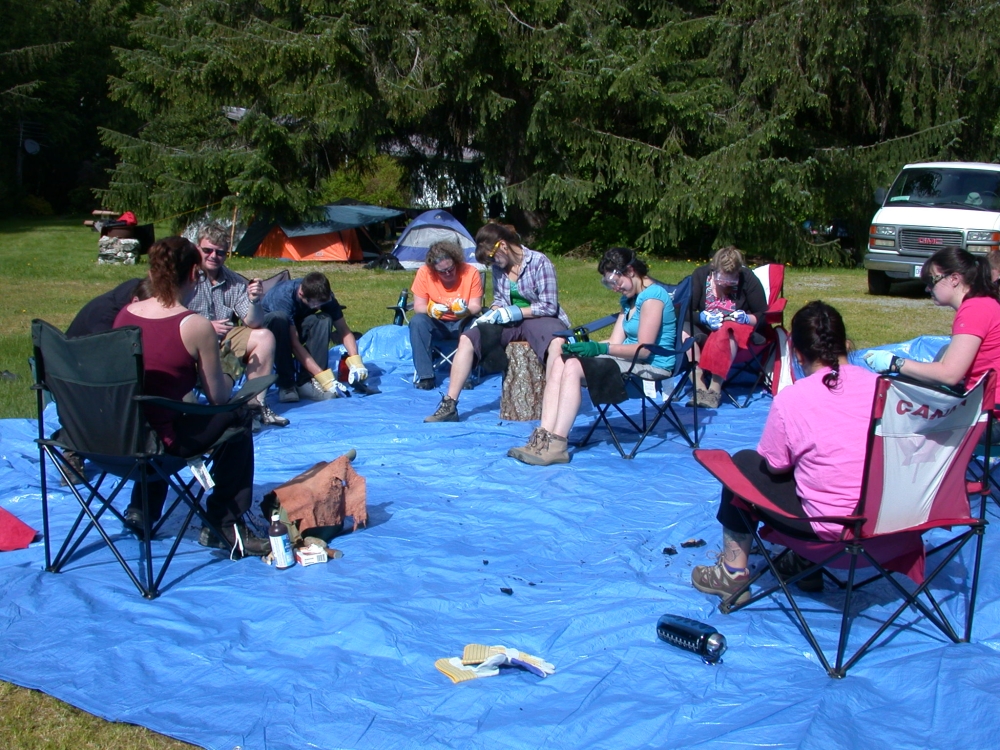
Contact Information
For further information please contact Dr. Farid Rahemtulla
farid.rahemtulla@unbc.ca
